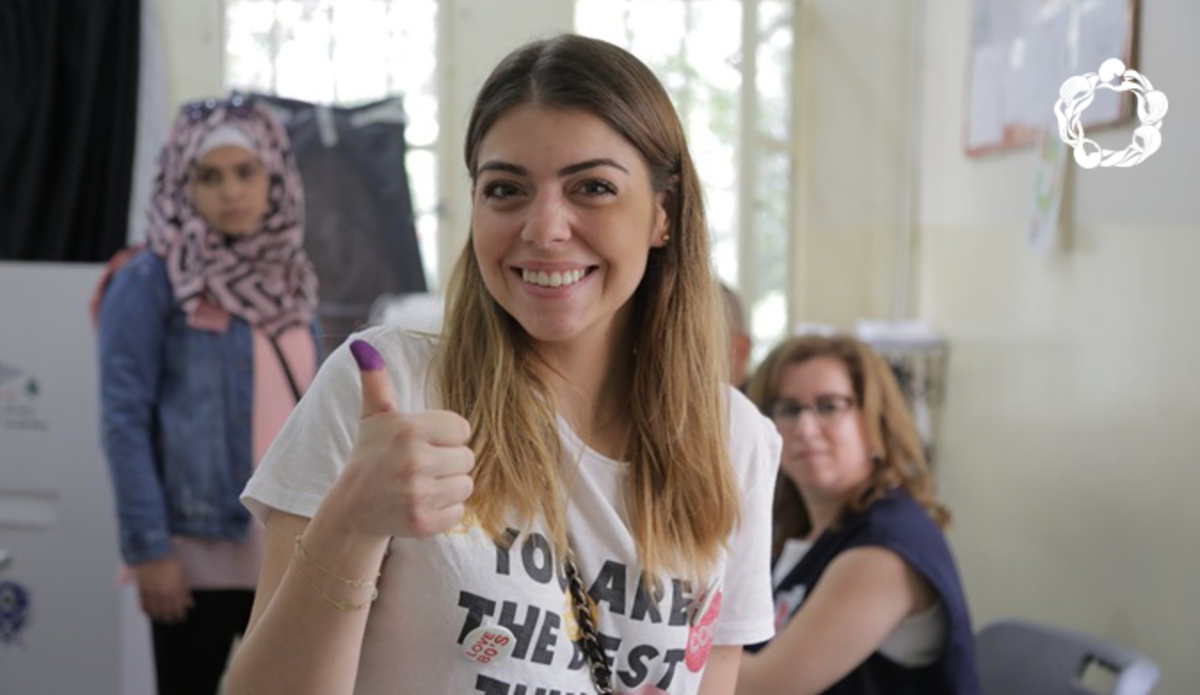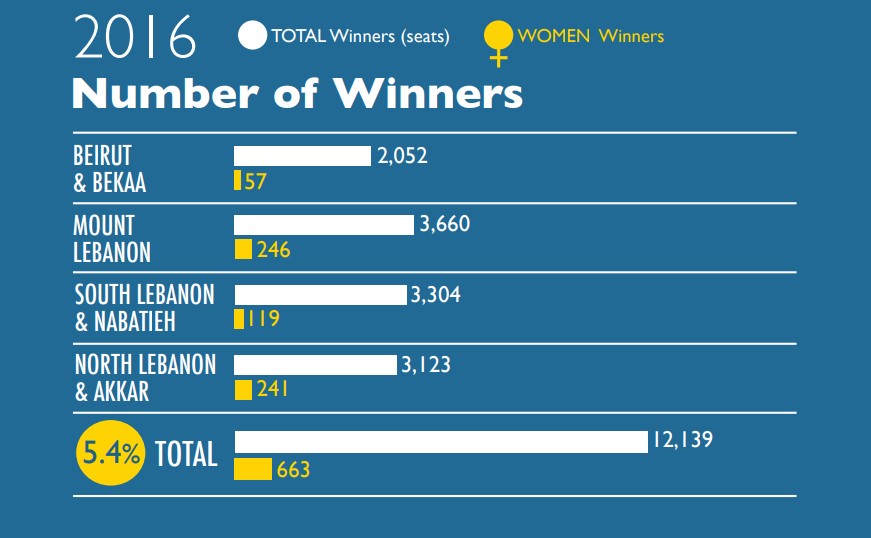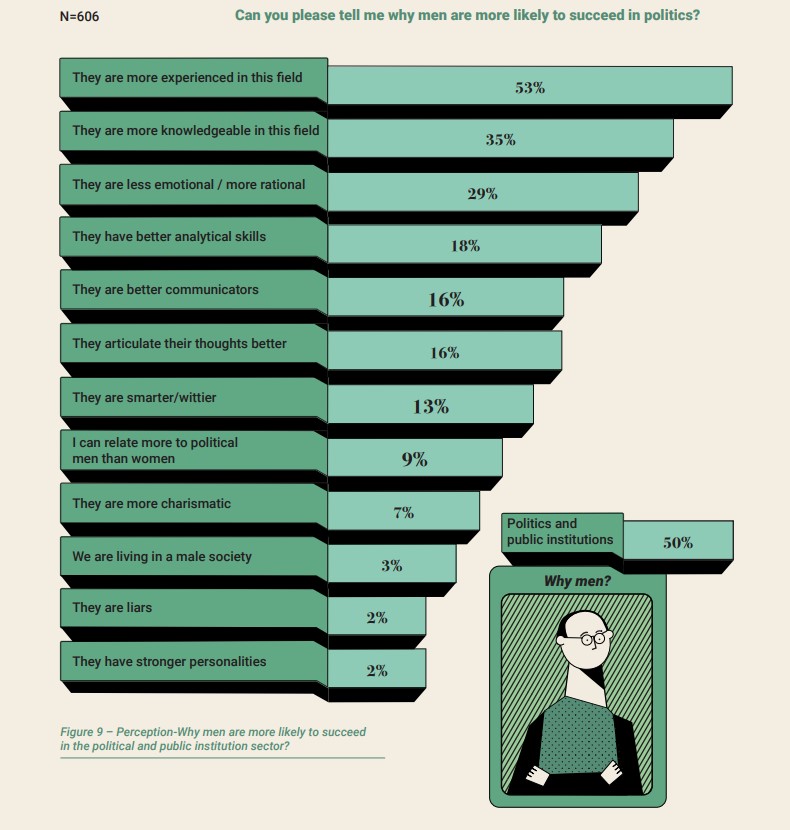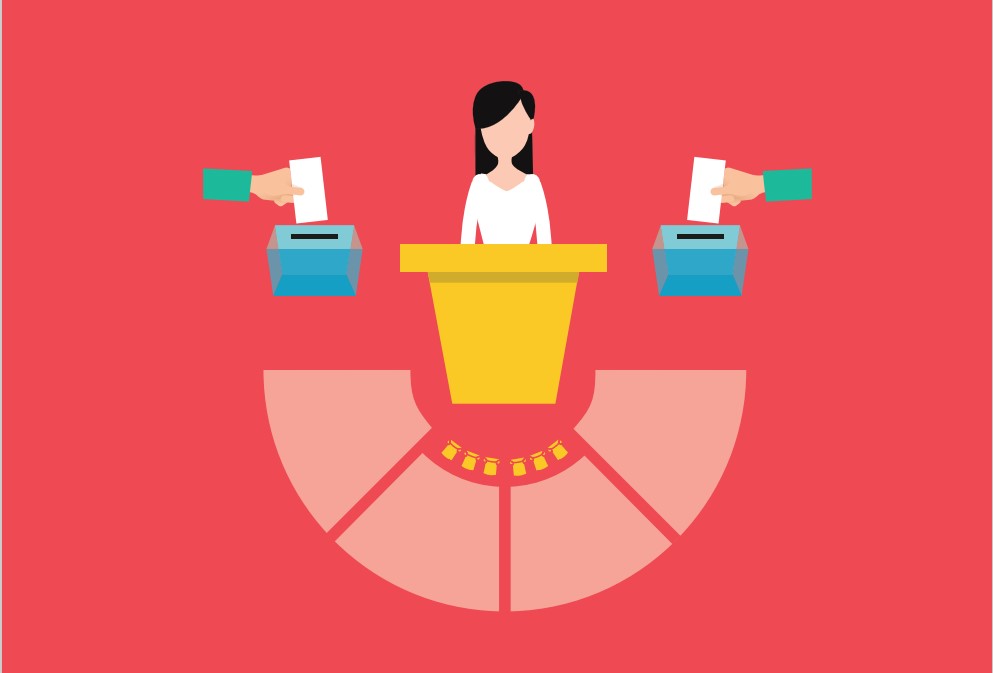“At the current rate of progress, it will take the world 145.5 years to attain gender parity in politics”. This is what the Global Gender Gap report 2021 estimates, as the gender gap in Political Empowerment remains the largest of all the four gaps tracked.
Of some 35,500 parliament seats across the 156 countries covered by the index, only 26.1% of them are held by women.
World Economic Forum Global Gender Gap report 2021
A Pandemic At The Wrong Time
As gender gaps in politics were already heavily existing pre COVID-19, the pandemic that emerged in 2020 exacerbated the pre-existing gaps between men and women.
On the whole, the international economical stagnancy elevated additional obstacles for women to reach leadership positions. COVID-19 exposed more women around the world to reduced salaries and resources, making them more vulnerable, and less apt to step into politics. Hence, Men’s dominance on the economical level can give rise to their dominance in ruling public institutions as well, and widen the gaps again in politics despite the years of progress. The COVID outbreak for example, caused a rise in women’s poverty by 3.3% in Colombia due to the shutdown in economic activities, notably in social sectors where women are more likely to work. After that, the country lost 37 positions in the Global Gender Gap Index 2021 rankings in just a year! (Between 2020 and 2021).
Moreover, the COVID outbreak also led to postponing several political events such as elections. In the Middle East, where countries score the highest gender gaps, postponed elections spanned the region. In Iran for instance, the second round of parliamentary elections was moved by five months. Similarly, the parliamentary elections in Syria were moved from April to July 2020 for the same reasons. The delay in elections means essentially that change will have to wait a few more to occur.
Taking Lebanon as an example of a country ‘postponing change’, in the 2009 parliamentary elections 4 women won the elections. Whereas in 2018, after 9 years of intentionally delayed elections, 6 female candidates made it to parliament. It is true that it is a non-considerable evolution in numbers, but still means that 50% more women made it through elections compared to the previous year. Thus, every time an electoral round between 2009 and 2018 in Lebanon was delayed, a potential 50% more women could have become parliament members.
A Story of Numbers
From the first country in the MENA region to recognize women’s rights in voting in 1952 (that is only 5 years after men), to the one which ranked 132 out of 156 countries in the Global Gender Gaps Index. Lebanon has been toppling in the last few years between gender equality and inequality.
Diving deeper into Lebanon’s 2021 scorecard, the country’s main gender gap resides in its political inclusiveness. While it scores 0.638 in the Global Gap index, Lebanon’s score in political empowerment is limited to 0.129 (0.00 = imparity; 1.00 = parity).

According to UNDP’s Publication “Women in the 2016 Municipal Elections”, women’s participation in municipal elections witnessed a very modest rise in Municipal Women Elected between 2010 (4.6%) and 2016 (5.4%): 663 women from 12 139 winners.
On the national level, 86 women registered to compete in the 2018 parliamentary elections, in contrast with 597 men candidates: an unprecedented number as indicated in a study conducted by UNDP. However, despite all the efforts deployed by NGOs and alternative parties in favor of female candidates, only six women won the elections, which equals 4.7% of the total number of MPs actually in the Lebanese Parliament: quite a low percentage.
Furthermore, as cited in the World Economic Forum report, Lebanon is one of the countries “where the share of women ministers increased the most by January 2021 from January 2019”: from 3.4% to 31.6% in Lebanon’s case, a pretty good indicator. However, the rise did not last for long! In the last government formed on September 10, 2021, by prime minister Najib Mikati, only one woman occupied a ministerial position in the government, which brought down the percentage again.
Challenges: One Battle, Many Fronts
In preparation for the 2022 municipal and parliamentary Lebanese elections, a national study developed during the period of January – March 2021 by Madanyat and in partnership with UNDP, showed that Lebanese women willing to delve into the political field face challenges on three different levels: political, social, and economic front.
Politically speaking, the “dysfunctional political system” and the “absence of an effective state” are the core challenges women face during their political journey, the study found. The primarily sectarian Lebanese electoral law, the prevailing corruption, and lack of accountability are real threats to women’s participation in the field, and a constant burden for those who have already kicked-off that path.
On the social front, the religious and family norms are the illness to be treated. The patriarchal mindset embedded in society often weakens women’s power and willingness through prevalent stereotypes, categorizing women as weak and vulnerable, and limiting their role to taking care of the household and the children.
Lastly, from an economic perspective, the drastic economic situation led many women outside the country aiming to pursue their goals and ambitions with a minimum of financial stability, which is reducing the number of women ready to defy the current status quo.
Re-Evaluating the Attitude of Lebanese People Toward Women in Politics
It is all about the people they say. Aside from problems in governmental laws, one of the recurrent problems evoked is the perception of people to women, notably, the perception of women towards each other. Especially after the 2019 revolution and the Beirut blast in 2020, it would be of great interest to understand the attitude of Lebanese people toward women and their role in politics. In the study conducted by Madanyat mentioned earlier, “perception and likelihood of success per sector by gender (men vs. women)” were evaluated. A sample of 582 men and 618 women were asked about their opinion about “which gender (men, women or both) is more likely to succeed for each of the following sectors?”. When it came to Politics and public institutions, 45% of women who answered considered men as more competent in the field, only 5% considered women as more capable, and 50% believed that both can equally succeed. One can still notice that a large number of women respondents still believe that men are better in leadership and decision-making positions.
This study serves essentially “as a backbone for the work of political parties, NGOs and the media, as it provides them with insight into the standpoints of the Lebanese people, women and men alike, towards women’s participation in the political life”, so they can act accordingly, and design related programs to engage more women in the next elections’ processes.
Siyasiyyat
Women in Politics Have a Name Now: Siyasiyyat
In Lebanese, it has always been “Siyasiyyoun”, which means men in politics. Today, women’s existence in the field is recognized, and even has a name. From now on, they are called “Siyasiyyat”.
Siyasiyyat is an initiative by FNF Lebanon and Afaal aiming to support women in their political journey, and actively prepare them to dive effectively in that area. This initiative is inspired by the European women’s academy which is not merely about political awareness for women, but rather a program for women who actually want to run elections. “I felt this is exactly what we need in Lebanon”. And that’s how Siyasiyyat started, Lynn Harfoush, the initiative’s Project Manager and Founder told us.
Seeing more women candidates isn’t the goal, we want women to be truly present in decision making positions
Lynn Harfoush – Siyasiyyat’s Founder and Project Manager
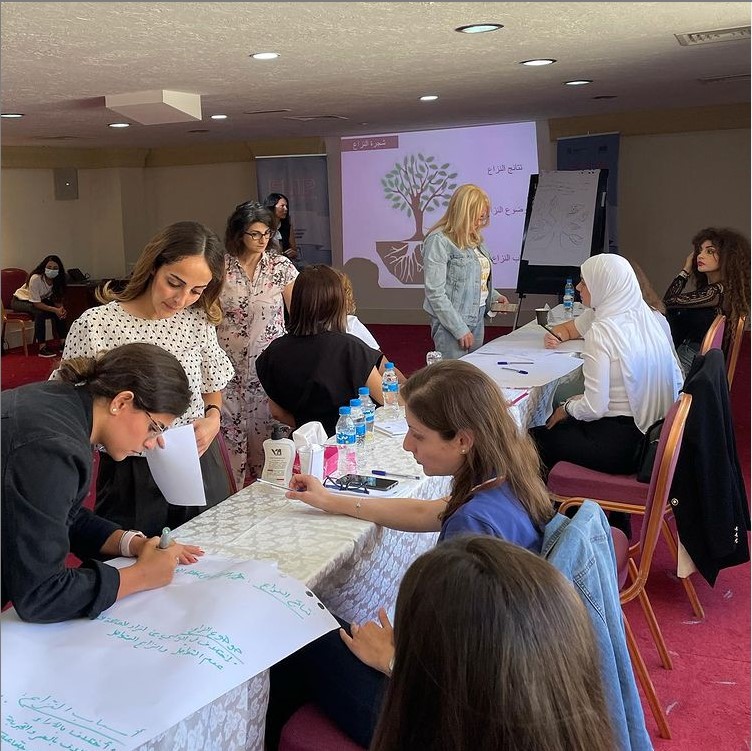
From leadership and communication skills to combating harassment, understanding the Lebanese electoral law, negotiation, crisis management, conflict resolution, campaigning, lobbying, and fundraising, along with many more, the Siyasiyyat earned a long roaster of skills during three days of online technical, preparatory workshops and a bootcamp. Lynn, the Project manager, emphasized during an interview for IVolunteer the importance of the bootcamp: “We needed to live together”. The bootcamp was an essential step to help participants build their skills, but also, and more importantly, create a community. “One of our main problems is that women currently practicing politics treat each other as if in a competition rather than as supporters”. Siyasiyyat’s main plan is to change that, to create a system, a community, where women truly understand and appreciate each other, and eventually, become each other’s first supporters.
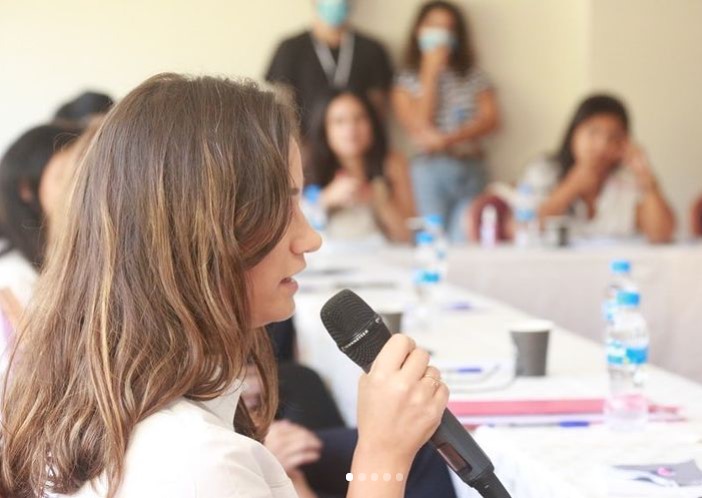
Getting to know Siyasiyyat better, the initiative believes in 4 crucial principles for a better country: sovereignty, secularism, free economy, and social justice. Building on that, among the 30 profiles selected to participate from 120 applications, all 30 agreed with the latter.
Siyasiyyat, also known as FLIP (Females Lead In Politics), formed in its first round a friendship between 30 women, according to Lynn, “who can, in whatever situation, take the lead. They are a team, they are together, and they definitely have enough knowledge to do so”.
Siyasiyyat: The Next Steps
“What’s wrong with training, is that it all ends when the training does. Whereas to lead successfully in politics, you need a lot more than something that ends”.
It is in that spirit that Siyasiyyat is still pursuing its mission after a first successful round, and many more. A second round is planned to happen before the end of 2021, so that a new group of women would be ready to FLIP the status quo in the 2022 Lebanese parliamentary elections.
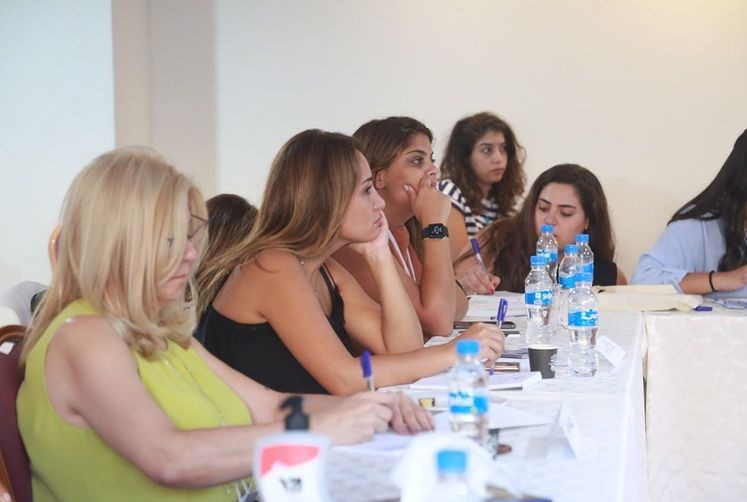
“And now, it is a matter of continuous hard work and determination, to keep the flame on, and do all that it takes to succeed.” After the completion of the first round, each participant was evaluated by the organizing team: who is willing and technically ready to embark on political battles? One-on-one communication is actually happening between the board and the participants to put into action what they earned during Siyasiyyat, “we don’t want things to end here” affirmed Lynn. Siyasiyyat will provide support for any kind of path participants wish to take, including political activism, awareness, elections, among others.
By the same token, Siyasiyyat aims to be ready by next November to form a Campaign Strategy Team specially tailored for women. “What we want to do is to transform Siyasiyyat to an Electoral Campaign Strategy Team to monitor those already established by other electoral lists, truly for women”, “whether we accept it or not, women need that extra work”, a double work to convince more people to vote for competent women, “and that’s what Siyasiyyat is for”, concluded Lynn, the Project Manager and Founder of the initiative.
In the future, there will be no female leaders. There will just be leaders.
Sheryl Sandberg – COO of Facebook
From Painting in a Bad Light To Paving Off The Way
“It’s a long way” is what Lynn Harfoush, Siyasiyyat’s Project Manager emphasized. A long way, requiring hard work, perseverance, and solidarity. The 2018 Parliamentary Elections Gender Key Results, UNDP’s publication, suggested that efforts should be equally distributed among five essential levels: Legal framework, electoral management and administration, media, political parties, voters’ education and electoral campaign.
It’s the work of a whole society to include women in political decision making!
Fostering women’s political participation would be like a hand trying to catch a ball. Every finger helps in ensuring that the ball will be well received. Similarly, each of the five Stakeholders mentioned is essential in making more places for women, each stakeholder not participating in that process would delay, or contravene women’s arrival to parliament, municipalities, and public interest positions.
On the first hand, ensuring a likely environment for women to take a step in politics is mandatory. When you teach a child how to write, you need to give him a pen. Amending discriminatory laws like sectarian civil personal status laws, or legislations depriving women of passing the nationality to their children, among others, automatically gives women more freedom and means to start a political journey by eradicating the patriarchal mindset of such laws.
From other perspectives such as media and voters’ education, the main goal is to eliminate prevalent gender stereotypes in politics. This could be done by giving women more space to express themselves, and by asking the right questions, far from personal matters, appearance, or insults. Making awareness campaigns through media or in schools and universities, are just complementary actions in preparing a whole community to welcome new women leaders, to welcome change.
Finally, when it comes to political parties, they’re exactly a sample of a nation. You can never ask political groups who never practiced gender equality or democracy internally to practice such concepts on a national level. Thus, political parties have a key role to play in adopting gender sensitive strategies. In Lebanon’s case, it means that the absence of women at the head of political parties is a direct and irrefutable added obstacle for women in politics.
On that note, we end a long, yet rich piece, hoping to normalize women’s participation in politics and power positions in Lebanon, and all over the world as well. In Japan, Syria, Morocco, South Africa, and many more countries where huge gaps still exist. “Women’s political participation is a fundamental prerequisite for gender equality and genuine democracy” as cited in a briefing of the European Parliament. And as achieving gender equality in politics comes in the core work of the SDG 5 set by the United Nations for the 2030 Agenda, world leaders should invest more in solutions more inclusive for women in politics.
We want more women leaders on a national and international level for better representation and improved crisis management.
No country can ever truly flourish if it stifles the potential of its women and deprives itself of the contribution of half its citizens
Michelle Obama
IVolunteer International is a 501(c)3 tech-nonprofit registered in the United States with operations worldwide. Using a location-based mobile application, we mobilize volunteers to take action in their local communities. Our vision is creating 7-billion volunteers. We are an internationally recognized nonprofit organization and is also a Civil Society Associated with the United Nations Department of Global Communications. Visit our profiles on Guidestar, Greatnonprofits, and FastForward.
